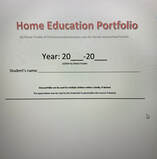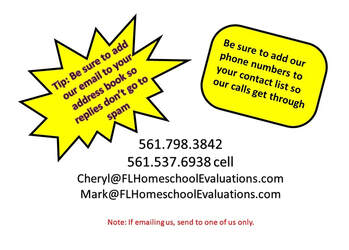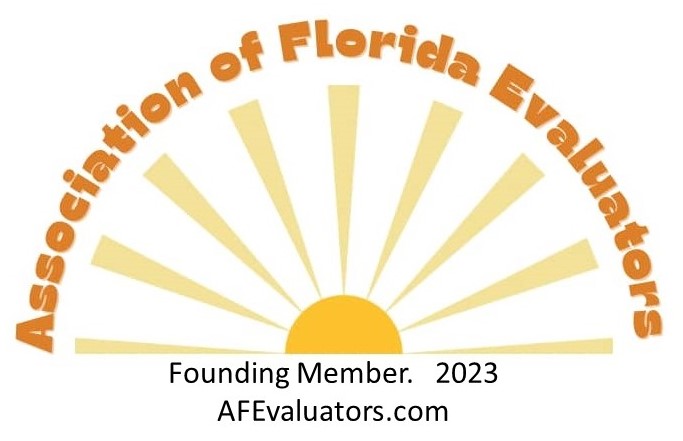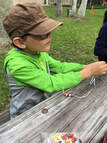|
Talking About
Florida Homeschooling... Evaluations and More |
A good evaluator works for the parents, assisting them in meeting legal requirements and in supporting them when districts overstep their bounds." |
|
Florida law does NOT require any particular curriculum. Homeschool parents do not have to use public school materials. Parents may use any materials at any levels that work for their children. Materials do not even have to be textbooks or workbooks but can be websites, apps, ordinary books (sometimes called living books), magazines, graphic novels, or whatever works to help your children learn. Note that there’s no such thing as accredited curriculum; there are accredited programs that offer curriculum, but there’s no need to use them. Even in high school, feel free to use any materials that work for your children. You can adjust levels without permission from anyone or change materials if one isn’t the fit you thought it would be. Where do you find curriculum? There are many available sources these days. Many buy from online sites--whether directly from publishers, or general book sales sites, or sites specifically geared to homeschool materials. There are Facebook groups specifically for selling homeschool curriculum, eBay.com, Amazon.com, and more. Some homeschool groups and homeschool conventions often sell curriculum. Used curriculum can save your budget. There are free materials available online or through a local public library and some schools or school districts offer free materials if you use the magic words "off-adoption materials" when asking. How to choose? My suggestion is to proceed slowly and carefully so you don’t waste money on materials that you won’t use. (Spending too much money on curriculum that wasn't used has been one of the top two regrets of veteran homeschoolers when asked about their regrets in homeschooling. The other top regret was not starting homeschooling sooner.) You don’t have to have curriculum in place to begin homeschooling. You can start with a library card or an internet connection or a few books or educational videos--much learning can happen with such things. Before actually purchasing materials, I suggest researching homeschooling methods or styles first to learn the options--copying the schools’ way of doing things isn’t the only option and you may find ways that will work better for your family. This will involve thinking about how your child prefers to learn as well as what you want such as: Religious or secular? Workbooks/textbooks or lots of hands-on materials? Family-style or each child with his or her own separate levels? Rigid schedules or calmer, gentler schedules that allow for researching your child’s interests? Lots of written work or more discussions and read-alouds? High tech or low tech? and so on. Using that information to help find materials that will be a good fit. (Besides the link above for homeschooling methods or styles, here are links for another and another.) Consider deschooling first if your children were previously in schools. Deschooling is a good process for figuring preferred learning styles for children who were in a school previously--especially older children. In addition, deschooling helps both parent and child transition from thinking that education can only happen in schools and other attitudes taught by schools. Deschooling is something many new homeschooling parents try to skip, but homeschooling is much more effective with a period of deschooling done for a few weeks or months before any curriculum is chosen. See here for further information on deschooling. Once you have gathered information on how your child and you prefer to homeschool (and have deschooled if your child was in a school), use that information to help search for learning materials that are more likely to work for you and your family. There's no perfect curriculum, no curriculum that's best for all children at a certain grade level. Searching with information on the sort of curriculum that will work better for your child will make the curriculum choices more likely to fit. If you have a name of a homeschooling style that seems a good fit, that can help you search online for appropriate materials for your family. (The links in the previous paragraph can help figure this out.) Once you have curriculum in hand, feel free to tweak it to make it work better for you. You don’t have to use every question or lesson--teachers and schools rarely use everything in the book and you don't have to either; you can have your child do enough to be sure your child understands the material and masters it, but many children don't need a lot of busywork to figure that out. Lessons can be done orally instead of in writing--talking about what was read or learned can be an informal way to figure out if your child understands and to quickly figure out what needs to be studied more. You can skip a lesson or chapter and come back later if the child is not yet ready for it. Or take the time to delve more into topics that your child is curious about. You, the parent, are in charge of your child’s education when homeschooling. As long as your child is learning and you have records of that learning, you are doing it right. More information about curriculum options are on our pages for curriculum options including faith-based and secular options and for students with special needs including gifted students. This page may also help: homeschoolingagain.wordpress.com/2020/07/01/how-do-you-choose-curriculum/ Curriculum review sites--these work best if you’ve already heard of a curriculum and want more information about it: https://homeschool-curriculum-reviews.com/ (Includes "math curriculum selector" quizzes to help find a good fit for math curriculum) https://cathyduffyreviews.com/# https://www.thehomeschoolmom.com/homeschool-curriculum-reviews/
0 Comments
Your comment will be posted after it is approved.
Leave a Reply. |
Archives
April 2024
Categories
All
|

 RSS Feed
RSS Feed






